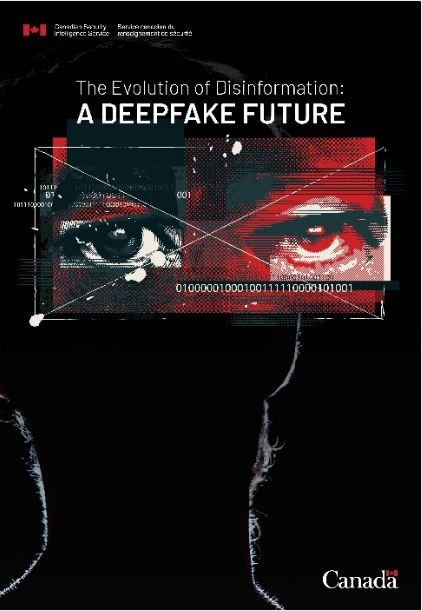 Title: The Evolution of Disinformation: A Deepfake Future
Title: The Evolution of Disinformation: A Deepfake Future
<< This report is based on the views expressed during, and short papers contributed by speakers at, a workshop organised by the Canadian Security Intelligence Service as part of its Academic Outreach and Stakeholder Engagement (AOSE) and Analysis and Exploitation of Information Sources (AXIS) programs. Offered as a means to support ongoing discussion, the report does not constitute an analytical document, nor does it represent any formal position of the organisations involved. The workshop was conducted under the Chatham House rule; therefore no attributions are made and the identity of speakers and participants is not disclosed.>> Download Report: Here
Coined by combining “deep learning” and “fake,” deepfakes are synthetic media that use artificial intelligence (AI) to create realistic-looking but entirely fabricated content, often in the form of videos or audio recordings. As these hyper-realistic manipulations become more sophisticated, the impact on individuals, businesses, and even democracy itself is increasingly profound.
Defining Deepfakes: Unmasking the Illusion
Deepfakes are created using deep neural networks, a type of machine learning that mimics the way the human brain operates. By training these networks on vast amounts of data, they can learn to replicate facial expressions, voice patterns, and other distinctive features of a person. The result is a seemingly authentic video or audio recording featuring individuals saying or doing things they never did.
The primary goal of deepfakes is to deceive, and their applications are diverse. From manipulating political figures to creating fake celebrity endorsements, the potential for misuse is vast. Deepfakes have also infiltrated personal lives, with instances of individuals being targeted for harassment, defamation, or extortion through fabricated content.
Impact on Society: A Pandora’s Box Unleashed
The consequences of deepfakes extend far beyond mere entertainment or deception. One of the most significant concerns is the erosion of trust. As deepfakes become more convincing, distinguishing between genuine and manipulated content becomes increasingly challenging. This erosion of trust poses a threat to the foundations of communication, journalism, and public discourse.
In the political arena, the potential for deepfakes to sway public opinion or manipulate election outcomes is a growing concern. Imagine a world where political leaders’ statements can be convincingly altered, leading to misinformation on a global scale. The consequences for democracy are dire, as citizens may find it challenging to make informed decisions when faced with a flood of deceptive content.
Businesses are also vulnerable to deepfake threats, as the technology can be used to create fake product endorsements, false financial statements, or manipulated executive communications. The reputational and financial damage resulting from such misinformation can be devastating.
Combatting the Deepfake Menace: Technological and Ethical Frontiers
Efforts to combat deepfakes involve a combination of technological solutions and ethical considerations. Researchers and tech companies are investing in advanced detection tools that use machine learning to identify inconsistencies in media content. Additionally, there is a growing emphasis on media literacy and education to empower individuals to critically assess the authenticity of the content they encounter.
Ethical considerations also play a crucial role in navigating the deepfake landscape. The responsible use of AI and a commitment to transparency in content creation are essential to mitigating the negative impact of deepfakes. Collaboration between governments, tech companies, and civil society is necessary to establish guidelines and regulations that address the ethical challenges posed by this technology.
In conclusion, the rise of deepfakes represents a paradigm shift in the way we consume and trust media. As society grapples with the consequences of this technology, the need for proactive measures to detect, prevent, and mitigate the impact of deepfakes becomes increasingly urgent. Only through a concerted effort on technological, educational, and ethical fronts can we hope to safeguard the integrity of information in an age where reality can be deceptively crafted.
Sky News Australia: ‘Deepfakes, destruction’: Artificial intelligence’s ‘real danger’ to humanity

